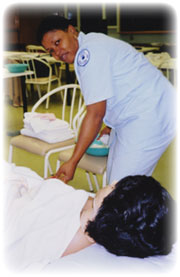 |
|||||||||||||||||
|
|||||||||||||||||
PROGRAMS |
|||||||||||||||||
| We provide 4 programs at present:
Medical Office Assistant Program (MOA) The objective of the Medical Office Assistant program is to allow students to acquire satisfactory skills and demonstrate competence in a variety of medical office administration and clinical skills. Administration skills include bookkeeping, billing and collection, records management, patient data collection, typing, transcription, word processing, appointment scheduling, written correspondence and telephone techniques. Clinical skills include patient preparation simple diagnostic procedures such as vital signs and collection of specimens. Students are encouraged to achieve a "Certified Medical Secretary" certificate through the Ontario Medical Secretaries Association. All examinations are a t the option and expense of the student. Course Content includes
Course Length
The PSW Program is 640 hours in length, and consists of two important components: Theory and Practicum 
The Practicum enables students to apply their skills and knowledge, acquired during in-class training, to the workplace as students-in-training.
Full Time Classes are held 9:30am to 2:30pm, Monday to Friday for 12 weeks. Part-time evenings programs are available. NSHC has developed bridging programs to meet the training needs of existing health care workers who have training and certification as auxiliary care providers. This program will build on the skills you currently possess and span the gap to the new level of care provider, the Personal Support Worker. This course requires a certificate as a Health Care Aide, Home Support Worker Level I, II, or III. Part-time evenings programs are available. Personal Attendant Certificate Program (PA+ 2) Personal Attendant Student comprehension of theory and clinical skills will be evaluated on an on-going basis through written examinations and evaluation of practical skills. This training responds to the needs of clients who are active in directing their own care and training attendants to meet their own specific care requirements. Role of the Personal Attendant The PA will be trained in the skills, both theoretical and clinical, to assist the client with ADL in a manner in keeping with the client's wishes and specific requirements. The client will further participate in the training of their PA, either formally or informally. Responsibilities of a Personal Attendant Food Handler Certification Training Food Handler Certification Training Why Is Food Safety Mandatory? Research has shown that food premises with trained staff are better at complying with safe food handling and sanitation practices. This translates into reduced risk of foodborne illness in the community. Who has to be certified? The bylaw requires that the owner/operator of food establishments ensure that there is, at all times when the establishment is operating, at least one (1) Food Handler Certificate working in a supervisory capacity in each area of the premises where food is prepared, processed, served, packaged or stored.This includes restaurants, fast food take-out, cafeterias, nursing homes, hot dog vendors and childcare facilities that prepare food or serve food. Canadian Food Safety Training offers Food Handler Certification Training to provide food handlers with the knowledge of safe food handling practices. Who would benefit by our 'Certified Food Handler' training course? If you are currently working or planning to work as a cook, assistant cook, chef, server, caterer, baker, delivery person, dishwasher, restaurant owner or manager, hot dog or street vendor, receiver of foods, supervisor, stock person, nurse, nurses aid, personal support worker, nanny, early childcare worker, care giver. Anyone who comes in contact with or handles food in any way should be trained in Food Safety.
|
|||||||||||||||||
